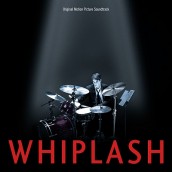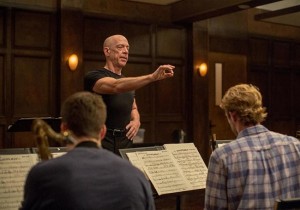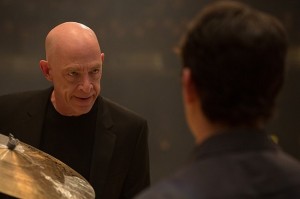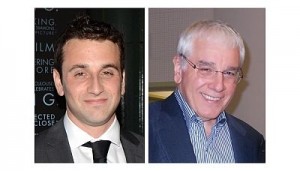In a cinema where wannabe musicians have their aspirations lifted through the very mild tribulations of crotchety, yet ultimately humane instructors, filmmaker Damien Chazelle’s WHIPLASH is FIGHT CLUB as opposed to FAME – the equivalent of a cymbal in the face, or a shower of blood splashed across a drum kit. While young percussion prodigy Andrew Neyman (Miles Teller) gets out of the way of the first abuse-bomb, he’ll have plenty of blood, sweat and tears to give in his sadistic servant-master relationship to his instructor Terence Fletcher, a jazz drill sergeant who makes the scream-swear martinet in FULL METAL JACKET look like Rebecca of Sunnybrook Music Conservatory Farm. Fletcher’s determined to slap the greatness out of his students even if it means driving them to madness, and the desperate-to-please Andrew is determined to show he’s got what it takes. Their resulting drum clashes are far more physical beat downs than anything resembling the free-form joy that jazz is supposed to represent, resulting in what just might be the most viscerally exhausting, and nastily exhilarating film ever made about what it takes to make music. Not the happy cafeteria jam that sends the kids onto the streets outside Julliard, but the agonizing pressure of rising oneself above the pop mediocrity of being “good enough.”
When you see and hear the insanity that Chazelle went through in his acclaimed, autobiographical film, you can easily understand why he tossed the drumsticks in favor of a likely far more successful career as a writer-director. Yet for a movie where music stands for anything but harmony, WHIPLASH benefits from a terrific soundtrack that works as pure jazz and devastatingly psychological scoring as Andrew’s beloved music is gradually twisted inside of his head. The score by Chazelle’s fellow Harvard grad Justin Hurwitz is as far different imaginable from their joyous jazz musical debut with 2009s GUY AND MADELINE ON A PARK BENCH let alone the brilliantly lush “movie jazz” pioneered by Alex North’s A STREETCAR NAMED DESIRE or Elmer Bernstein’s MAN WITH THE GOLDEN ARM. Instead, Hurwitz’s astonishing work is work plays jazz as a progressive mental breakdown, with warping, drone-like effects over slurred, blaring carhorn brass and relentless percussion. A grimly poignantly theme for intimate piano and bell percussion (or played in devilishly melodic fashion by Fletcher on the ivories) capture the sadly wounded, beyond-eager to please child within Andrew. It’s a score as a skittering time bomb, waiting to blow as it curls back in defeat after one profane explosion after another. That Hurwitz has a whole other writing gig that includes THE SIMPSONS and THE LEAGUE makes his musical work in WHIPLASH all the most astonishing.
The more pleasantly traditional jazz stylings in WHIPLASH go to Tim Simonec, an orchestrating and conducting sideman second to none. Such acolytes as Michael Giacchino and Graeme Revell have kept Simonec in constant scoring stage demand to make scores like DAWN OF THE PLANET OF THE APES, AEON FLUX and THE INCREDIBLES sing, all while Simonec has made his own composing bones on SURVIVAL GAME and FIGHTING TOMMY RILEY. In WHIPLASH, Simonec’s big band numbers “Too Hip To Retire,” and “Upswingin’” along with the rehearsals for Fletcher’s tightly wound jazz competitions are the energetic, ironic contrasts to Hurwitz’s neurotic grooves. This is brass and percussion swing at its happiest, which is anything but what’s going on – especially when Simonec’s name to conjure utter terror in Andrew. Simonec’s swing is right in line with WHIPLASH‘s nostalgic use of Stan Getz’s “Intoit,” Duke Ellington and Juan Tizol’s “Caravan” (which provides the film with its bravura finale) and Hank Levy’s titular tune, which soon becomes a thematic callback to Fletcher’s repetitive abuse.
Now Hurwitz and Simonec reflect on creating an alternately troubling and joyous jazz groove that will likely make any potential student think twice about just what it takes, while showing just how dangerously exhilarating that drum-beating journey can be.
ASSIGNMENT X: What was your moment when you decided to become a musician? And did that initial optimism ever get deflated?
JUSTIN HURWITZ: I started playing piano at 6. There were times that I hated practicing and wanted to quit, but stuck with it because everything else (sports) would have been more miserable. Now, I’m of course thankful that I kept music in my life.
TIM SIMONEC: I started taking organ lessons at the age of eight. My mother took me to practice until I was about 16. I started organizing small singing groups and then larger singing groups through college, but never considered music as a career. Again my mom kept saying, “You’re not gonna become a minister (which is what I studied for and majored in while in college). Why don’t you go into music?” However, I did become a minister of youth and music in the local church when fate took a hand. I was asked by a friend to write a theme for a local television show. For the first time in my life, I was fortunate enough to work with professional studio musicians. The very moment they played my theme was the defining moment of me going into the music business. I knew I wanted to write music for movies and work with studio musicians. This dream was realized about six years later when I moved to Hollywood and began scoring music for the show HAPPY DAYS in 1980.
AX: What do you think sets WHIPLASH apart from both “I want to be a musician” movies like FAME or other movies that try to capture the essence of jazz like BIRD?
HURWITZ: Whiplash shows the sheer physicality and brutality involved with playing music at a high level, in a way that I haven’t seen.
SIMONEC: I believe at the essence of this film there is a driving passion for Andrew to become the best as a drummer. The huge challenge and obstacle before him is to deal with Fletcher. It is the passion to make great music that becomes the very conflict between Andrew and Fletcher. I also think that the film presents a truer look at the very essence of making music and the conflicts that are inherent in having a musical career – romantic entanglements, encountering someone in a position of leadership who doesn’t have confidence in your abilities, a family that doesn’t quite understand what you’re going through, and trying to possess the inner drive that necessary to make it in music.
AX: What’s the big difference with having a director who’s also a musician, let alone one who’s made a film with autobiographical elements like WHIPLASH?
HURWITZ: Damien is amazing at communicating what he wants. He has a more advanced musical vocabulary than most directors. I don’t end up running around in circles trying to interpret a confusing note, like composers often do, because I always know what Damien is looking for.
SIMONEC: Working with Damien Chazelle, who is a drummer and has a great love of big band music, made the composition process extremely smooth and efficient. He was able to perfectly articulate the kind of compositions he wanted for each scene. Plus he provided me with audio examples from the archive of great big band music. Any suggestions or comments he had on my compositions only made them better. As to the autobiographical elements, I feel Damien was able to incorporate them into the final script and filmmaking process. His autobiographical experiences were secondary to making a powerful film and understanding the movie making process. He understood, and showed that all too well in the final product.
AX: Justin, were your school experiences the same as Damien’s, and if so, did that put you in better synch?
HURWITZ: Damien and I were roommates from sophomore year on, and had very similar lifestyles. We didn’t do a ton of partying. We spent a lot of time in our room, working. Until we made GUY AND MADELINE ON A PARK BENCH (our first film) at the end of college, our work was separate, but we always kept each other motivated and on task. We’d see that the other one was reading a blog or watching a YouTube video and say, “Get back to work.” There’s a similar sentiment in WHIPLASH — the idea that to be good at something, you have to work hard and sacrifice.
AX: Justin, did you work with Damien on the WHIPLASH short that got him the feature? And did you know how essential the music would be towards landing the deal?
HURWITZ: The short didn’t have any original music in it, only the titular song WHIPLASH which is a jazz standard composed by Hank Levy. But I knew that his plan was to make a feature, and that I would do the dramatic underscore and original jazz.
AX: Did you ever have an instructor as terrifying as Terence?
HURWITZ: Not as terrifying as Terence Fletcher, but I had a piano teacher who used to hit me on the back with a ruler.
SIMONEC: Thankfully, no. But I did have quite the opposite with an instructor who helped me greatly.His name was George Strombeck and he was the band director at Trinity College. My major was Bibl Studies. But I was so into music and was very fortunate to just bump into George after school while I was doing an arrangement for singers in an orchestra. I shared with him that I had so many musical ideas in my head that I really didn’t know how to write them down on paper. George then taught me privately after school how to interpret and write down complicated rhythms so that they could be played by instrumentalists. Unlike Fletcher he was always very enthusiastic about my work and extremely encouraging to me. I will always be grateful for the part he played in my musical path.
AX: If you ever had a moment where you felt you didn’t have it, what inspired you to continue?
HURWITZ: As a classical pianist growing up, I had a number of reality checks where I realized how much better other musicians were than I was, and that was sometimes demoralizing, but I kept at it because I knew that I was better at music than anything else I could be doing.
AX: How else could you personally could you identify with Andrew’s character?
HURWITZ: I don’t have the greatest social skills in the world. I usually choose to stay in and work over, go out at night. There’s an early scene in Whiplash where a bandmate asks Andrew how his weekend was and he says, “Fun,” when we know that he stayed in. I love that moment because it always annoys me when people ask how my weekend was.
AX: Conversely, do you agree with Terence’s teaching practices, or philosophy? How do you push someone without going over the edge? And how do you tell someone they’re not good enough?
HURWITZ: This is tough. I think it’s all right for a teacher to push a student as long as the student doesn’t break. Different students have different tolerances and breaking points, so a teacher has to adapt. There are aspects to Fletcher’s style that I certainly don’t agree with like his use of epithets, but I think it’s all right to be demanding and at times cruel depending on the student, their goals, and what they can handle.
AX: Do you think we’re letting “Good Job” mediocrity get away far more often in jazz, let alone music?
HURWITZ: I think the line Damien wrote, “There are no two words in the English language more harmful than good job” can be applied in a lot of areas, not just music.
AX: How did you want to create a contrast between Andrew and Terence’s music?
HURWITZ: The music Andrew plays is increasingly feverish throughout the movie. We only see Fletcher play music once, and it’s a very tender piano piece that I wrote. He’s such a monster throughout the movie, that it’s nice to see glimpses of his gentler side. Twice in the film, we see Fletcher’s vulnerability. Once when he talks to his class about a former student, and once when he’s at the piano.
AX: How did you go about choosing the jazz pieces for WHIPLASH, especially the title tune?
HURWITZ: Damien chose that piece because it was one of the tunes he played coming up as a jazz drummer himself.
AX: With WHIPLASH showing up so many times, how did you want to make its renditions different?
HURWITZ: You never hear the full song in the movie. You hear sections of it during the rehearsal scene, but Fletcher keeps stopping them because of mistakes. Then you hear part of WHIPLASH played well at a competition, but you never hear the chart in full in the movie. The full song is on the soundtrack album.
AX: New York City also plays a character in WHIPLASH. Do you think there’s an automatic association we draw from pre-existing tunes like “Intoit” and “When I Wake” that automatically conjures a bigger picture of Manhattan for audiences, even though we might not see any big recognizable landmarks?
HURWITZ: “When I Wake” isn’t pre-existing. I actually wrote it for Whiplash, to sound like something that was recorded in the 30s. And Nicholas Britell did some amazing production work to give it that old vinyl sound. But I do think that jazz and New York City go hand in hand in movies. There are so many jazz tunes where the #1 thing they conjure for me is the Woody Allen movie they’re associated with.
AX: Do you think the irony of WHIPLASH is showing how restrictive a work that’s supposed to be improvisatory can actually be?
HURWITZ: That’s a really interesting point, although I would maybe phrase it a little differently. I don’t think jazz is restrictive. I might say that the movie shows how much precision goes into jazz, a style of music that some people consider to be “loose.”
AX: What’s the biggest difference between rock drumming and jazz drumming? And with Miles having previous drumming experience, was it easier to push him further?
HURWITZ: You hold the sticks differently, and the rhythms are very different. Jazz is usually swung and full of syncopated rhythms while rock is straight. It was great that Miles knew his way around a drum kit already, but he still had so much to learn. Once he heard examples of the type of solos he was going to have to play, he got very motivated very quickly. What he was able to learn in the short time he did is astounding.
AX: Could you talk about “scoring” the practice sessions? And on those notes, have you ever played so fast your hands bled?
HURWITZ: The music in the practice sessions was generally designed to get more intense as the movie goes on. My hands have never bled because piano doesn’t abuse them like drumming does, but I’ve skinned my knuckles playing glissandos. That’s pretty badass right?
AX: Conversely, what was it like working with a non-musician like J.K.? And do you think it was as important to make his dialogue as convincing as his playing?
HURWITZ: J.K. actual does have a background in music. In fact, he went to music school. He didn’t have much experience playing piano, but I made him a note for note transcription of the pre-recorded jazz piece he had to play, and he played it perfectly. I came to set that day to watch his hands and make sure they weren’t playing the wrong notes, or playing out of time. There was literally nothing for me to do because he nailed it every time.
AX: What do you think sets “movie jazz” apart from the real deal, and were you trying to capture that real deal here?
HURWITZ: “Movie jazz” can sometimes be watered down. Sometimes it’s harmonically simplified, or lacks a solo section. What’s unique about this movie is that Damien portrays the music exactly as he experienced it. Granted, the film takes place in a music conservatory, so you’re not getting the heroine-addled club version of jazz, but it’s very accurate to the experience of playing jazz in a cutthroat music school.
AX: Justin, could you talk about the process of finding a style of underscoring that would complement the jazz pieces?
HURWITZ: Figuring out an approach for the dramatic underscore was a long conversation between Damien and me. We knew that the underscore shouldn’t be big band jazz, since there was already so much of that on screen and elsewhere in the movie. We knew that an orchestral score would be stylistically wrong, and that an electronic score wouldn’t make sense in a movie about musicianship and instruments. So we came up with the idea of building a score using the techniques of electronic scoring, but using 100% real instruments — in fact, only the instruments in a big band lineup. With this approach, we would have a score that felt atmospheric like an electronic score without actually being electronic, and organic to the movie’s existing soundscape, without feeling like just more big band music.
Our scoring session was really tedious because I recorded the score cues one note at a time. Literally, one note at a time. What this allowed me to do was layer and manipulate the notes in a way that musicians can’t. The resulting textures are reminiscent of an electronic score, except every note was either a sax, trumpet, trombone, piano, vibe, or upright bass. The majority of the notes in this score are slowed down to about 1/3 time, creating a hellish version of a big band sound. Damien and I joked that it’s like Andrew is being tortured by the very instruments he makes music with.
Woven into these textures is one familiar melody — the tune that Fletcher plays in the jazz club. I put that melody in many of the score cues, in major, minor, and other modes, depending on the situation. Damien and I love scores that are economical with melody — scores that establish one or two themes or motives, and use those themes or motives in every way they can be used. In this case, we found that one versatile melody was all we needed. The melody tied to Fletcher expressing himself at the piano seemed like the right melody.
AX: What’s almost funny is that when you finally see Terence playing, it’s the most relaxed, nice jazz piano tune ever. How did you hit on this theme, and what do you think it says about Terence’s personal life?
HURWITZ: I wanted a melody that was pretty, but has a little bit of pain in it. The song is in minor, and the very first note of the melody is a dissonance (a ninth). The song visits a major key during the B-section, but always comes back to minor. The piece both shows Fletcher’s more tender side, but also betrays a sadness. There was a scene that got cut from the film where we see that Fletcher lives alone, and eats dinner alone. I think that generally he’s not the happiest guy, even if some of his teaching is very fulfilling.
AX: One of the most impressive cues is “Accident,” where we see just how far Andrew’s commitment takes him. How did you want to play it as both a jazz piece, and one that goes inside of Andrew’s head?
HURWITZ: Like all of the score cues, this was built using the instruments of a big band lineup. Everything played by the brass and reed instruments is slowed to sound weird and unsettling. Then we have bass and drums, which aren’t slowed down. I layered several drum tracks at different tempos, so it feels crazed, at times cacophonous. And then right before the major event of the sequence, at the height of the cue’s craziness, I layered in a version of “When I Wake,” the sweet, old-fashioned jazz tune that played during the date in the pizza parlor. I thought it was an eerie juxtaposition.
AX: In that respect, do you think the score is ultimately about playing a mental breakdown, especially with its drone-like effects?
HURWITZ: I hadn’t thought about that exactly, but it’s a really interesting point. Some of these cues can be seen a little bit as a sum of all the jazz swirling around in Andrew’s head.
AX: The piano also plays an important role in signaling a sense of defeat and doom in “Dismissed.” Do you think it has an emotion drum percussion can’t reach?
HURWITZ: Absolutely. Being an instrument that makes notes, piano can get at certain emotions that drums can’t, like melancholy. That being said, the “Dismissed” cue has a rhythmic element to it too. The left hand is playing a rhythm that we’ve heard in many of the more intense cues. The rhythm is like one of a funeral march, or like the dread-evoking rhythm in Don Giovanni. Basically there are two motives in the WHIPLASH score: the melody from Fletcher’s piano song, and this rhythm. They come together in the “Dismissed” cue.
AX: There’s rarely been such a bravura jazz performance in film as the climactic “Caravan.” What were the challenges of this scene?
HURWITZ: Give the credit to Damien, his cinematographer Sharone Meir, and editor Tom Cross. Damien had storyboarded and built an animatic for the scene. Shot by shot of where the camera is, beat by beat. “On this beat the camera is on the trumpet. Then on this beat it punches in on the trumpet bell. Then during this measure it tracks from this saxophone to that saxophone.” It’s amazing how well planned it was. Then they shot it with a bunch of cameras, and edited it together.
AX:
SIMONEC: It was a real thrill to actually have my name mentioned in a movie. I had seen J.K. Simmons right after he wrapped up shooting the film and he told me that he mentioned my name in one of the scenes and we both figured it would end up on the cutting room floor. It doesn’t matter to me where it was used in the film, I just thought it was cool that it was used.
AX: Do you think a movie like WHIPLASH will encourage, or scare away future jazz musicians?
HURWITZ: Hopefully encourage them.
SIMONEC: Probably a little bit of both. I do think that in some small way, the difficulty of a character like Fletcher encapsulates the difficulties any musician will encounter on his or her way to making it in the music business these days. I personally feel that “Whiplash” is a quality music movie, and to that extent, it will encourage young musicians to really work hard. Those musicians that work hard at their craft, persevere, have a supporting wife like I have been so fortunate to have, and surround themselves with good people…will succeed.
HURWITZ: I’d like to think I could handle Fletcher at least as long as Andrew does, but my reflexes probably aren’t fast enough to survive a cymbal.
Buy Justin Hurwitz and Tim Simonec’s WHIPLASH score on Varese Sarabande Records available now HERE
Follow us on Twitter at ASSIGNMENT X
Fan us on Facebook at ASSIGNMENT X
Article Source:Assignment X
Article:Interview with WHIPLASH composers Justin Hurwitz and Tom Simonec
Related Posts:














